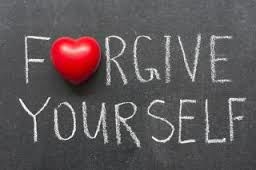Forgiveness
The Cure for Self Loathing? Self-Forgiveness
Are you repulsed because of what you did? You can set yourself free.
Posted July 21, 2017 Reviewed by Abigail Fagan
So often I meet people who have violated their own conscience and they now carry around a self-loathing in their heart every day of their life. The act becomes a kind of final self-judgment on who the person is and there seems to be no changing this.
I have been with men in a maximum-security prison and they approach me, making sure no one else can hear, and then they whisper how they cannot get over what they did, even if that act occurred 20 years ago, even if they have been punished by incarceration for decades. They loath themselves—in prison—isolated from the love of family, carrying this burden alone.
I have talked with people who are seemingly leading normal lives, going to work each day, raising a family, smiling at neighbors, but inside there is a kind of death happening. It is a complete withdrawal of love from the self because of past actions that are gripping the inner world of this person who, on the outside, seems to be moving through life well.
Even those who are religious, who have confessed their transgressions, knowing they are forgiven by God, cannot always let themselves off of the hook. I hear the following so often from well-meaning people who are trying to help the guilt-ridden person: “Are you larger than God? If you have been forgiven, then it is your turn to accept this and move on.” If only it were so easy.
Self-loathing is all too common and the “just get over it” approach does not work, as seen by the individual in prison who has carried self-loathing for 20 years, or the person with the seemingly perfect family who has withdrawn love from the self, or the religious person who continues self-condemnation even though any divine judgment has been lifted.
What is a person to do under such difficult circumstances?
I suggest that if any of these scenarios describes you, that you consider entering into the challenge of self-forgiveness.

Self-forgiveness is not quite the same as forgiving other people, although both have common features. When forgiving others, you struggle to be good to those who are not good to you. When you self-forgive, you offer, perhaps for the first time in years, a love for the self even though you let yourself down by your actions. At the same time, as you self-forgive, you rarely offend yourself in isolation from others, so part of self-forgiveness is to go to those who were offended by your actions and ask for forgiveness from them.
Here are a few pointers to help you learn to self-forgive (with more details in Enright, 2015, Chapter 7):
First, learn to forgive someone else (other than yourself) for any offenses they have imposed upon you. I recommend this because it often is harder to forgive oneself than it is to forgive others. So, start with others. As you do so, realize that you are not excusing the other. Then commit to do no harm. Commit to doing no harm to the other’s reputation, for example. Then as the late Lewis Smedes (1984) used to say, see the other with “new eyes.” See that the other, perhaps out of their own woundedness, has wounded you. See the other as a person, and all persons are special, unique, and irreplaceable. All persons possess worth or value.
As your heart softens toward this other person, who struggles and is imperfect, be ready to bear the pain of what happened to you so that you do not throw that pain back to the other (or to innocent other people who did not hurt you). Try as best you can to perform even one act of kindness toward the other, and this might include, for example, a kind word about that person to others. These exercises can take months to finally lead to a sense that you are forgiving this person for what was done to you.
Second, apply what you learned through forgiving others directly to yourself. Commit to doing no harm to yourself (for example, better nutrition, more rest and exercise). See yourself with “new eyes.” Yes, you are imperfect, but your strong guilt shows that you now have good intentions toward the self and toward others whom you might have hurt. You are a person of worth. Try to bear the pain so you do not subvert yourself or even toss that pain to others. Try to be good to yourself as an end in and of itself... and then go to those whom you have offended and seek forgiveness.
Third, be prepared for this to be a challenge that could take weeks or months. You are doing rehab of the heart and rehabilitation takes time.
This self-forgiveness process is more than just self-acceptance. In self-acceptance, you might end up only tolerating yourself. When you self-forgive, you rediscover your love of yourself and of others.
This self-love is not narcissism. Narcissism is a self-absorption. Self-forgiving is a reaching out to both self and others by being good to both. It is a form of giving, not self-absorption.
This self-love is not an excuse to keep engaging in the behavior that led to the self-loathing. In other words, you are not playing a game with yourself to keep an unwanted habit going. Instead, try to change that behavior while, at the same time, realizing that you are more than that behavior.
Self-forgiveness can take time. It is a struggle, but one well worth the effort.

Eventually, you conclude:
I am more than this action.
I not only accept myself, but I can love myself in a similar way that I love others (with a sense of offering goodness to them).
I am a person who gives myself permission to drop the self-loathing as the big lie against myself.
I never again will be defeated by a false sense of guilt, by self-hatred that does not tell the truth of who I am as a person.
As I am capable of giving love to others, I am capable of giving this to myself. It is here that I am free from the bondage of the past.
References
Enright, R.D. (2015). 8 keys to forgiveness. New York: Norton.
Smedes, L. (1984). Forgive and forget. San Francisco: HarperOne.




